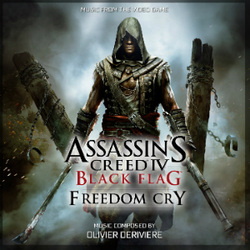
Freedom Cry is a little like the finale of M*A*S*H, where everything suddenly gets serious for an episode. It puts the tug-of-war conflict between the Assassins and the Templars on the back burner, focusing instead on Adewale's personal plight of freeing his brethren from the shackles he once bore himself. The Assassin's Creed series has thus far been admirable for its engagement of historical contexts and events. Freedom Cry brings that to a whole new level, addressing the topic of slavery with (mostly) great care. There's an emotional weight and resonance to this story yet unparalleled in an Assassin's Creed game.
Freedom Cry understandably deviates from the tone of its main series counterpart greatly. Brian Tyler, recent golden boy of the Marvel Cinematic Universe, scored Black Flag with a gritty, jaunty twang anchored by a memorable main theme. As expected, it suffered from an overlong album presentation typical of his scores, but it was nonetheless a solid addition to the series' musical canon. For Freedom Cry, Ubisoft brings on French video-game composer Olivier Derivière to take the DLC in a decidedly different direction. If you aren't familiar with the composer's work, pop over to my review of his stunning score to last year's Remember Me. With that staggeringly original work alone, Derivière proved himself one of gaming's most innovative and talented composers. Since then, I've been patiently twiddling my thumbs until his next release. And boy, was it worth the wait!
With Freedom Cry, Derivière raises the bar for the music of the Assassin's Creed series. His score is staggeringly complex, beautifully orchestrated, and all around a sweeping, thrilling piece of high-seas adventure! Given the game's Port-au-Prince setting, Derivière uses traditional Haitian music as the score's core element. Merging the vocal performances of La Troupe Makandal with the brisk string-work of the Brussels Philharmonic (and believe me, the string section gets a workout), Freedom Cry is a brilliantly spirited work, imbued with a vibrant sense of historical resonance. The main theme, heard in "The Root" and "Freedom Cry", is brought alive by the stirring vocals of Monvelyno Alexis. Alexis' performance is marked by a deeply affecting marriage of great loss and proud resilience, and is easily one of the highlights of the score. This theme is translated to the orchestra in "On to Freedom" and the sweeping "High Seas", each of which soar due to Derivière's deft command of the orchestra.
Most tracks are roughly structured around a singular idea, often one of the Haitian songs heard in purest form during the score's concluding tracks. Derivière's string and percussion sections dance around these ideas, before letting the Haitian vocals take center stage in thrilling bursts. Just listen to "The Fight For All", a tense ride through one of the score's more memorable melodies entitled "Marasa". The orchestra cranks up the momentum and then steps aside, letting La Troupe Makandal helm a rousing performance of the "Marasa" vocals. It's not only one of the best moments in the score, it's one of the most damned invigorating things I've heard this year. "Brothers and Sisters" explores the "Tanbouye" theme with similarly spirited style, while "Never Again" renders "Mache Mwen" a piece of determined resilience. These moments, occurring more frequently in the latter half of the score, signify highlight after highlight after highlight. You can imagine grasping at victory during the rousing performance of "Ounsi" in "The Last Chance" and the newfound agency of the freed slaves in the resoluteness of "Ogou O" during "United". I applaud Derivière for his immensely reverent treatment of the score's Haitian elements, for they help elevate Freedom Cry from a strong piece of video-game scoring to an immensely meaningful celebration of a culture stained by hardship and subjection.
Assassin's Creed IV: Black Flag (Freedom Cry) is a rich and vibrant score that enhances the gaming experience greatly. At once sweeping and intimate, it is perfectly toned accompaniment to Adewale's quest, lending emotional weight and an authentic cultural context to his story. Worthy of the highest praises I can give it, Freedom Cry is, simply put, yet another score to cherish from Olivier Derivière.
| A Few Recommended Tracks: "The Root", "Attack at Sea", "Brothers and Sisters", "The Fight for All", "Never Again", "High Seas", "The Last Chance", "United" Label: Ubisoft Music Availability: 24 track edition | |

 RSS Feed
RSS Feed
